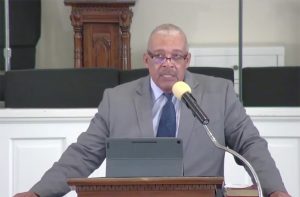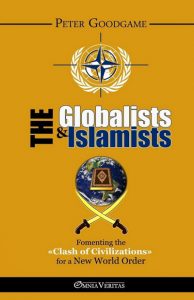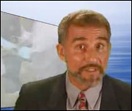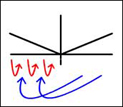A Summary and Criticism of the Documentary Film ”Zeitgeist Addedum”
by Edward Ulrich, updated May 30, 2021
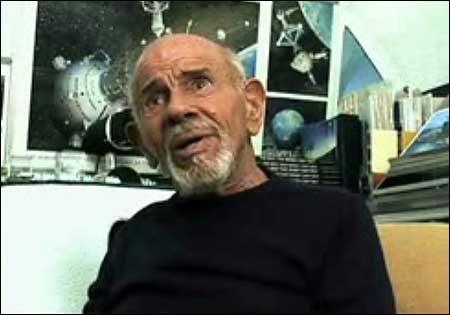
Jacque Fresco describes his vision of the “Venus Project” which deceptively shares many characteristics of the “New World Order.”
The documentary film “Zeitgeist Addedum” mixes legitimate information with disinformation meant to disguise the most significant causes of global problems, and it also suggests as a solution to global problems the eradification of the world’s nations, governments, and monetary systems for the establishment of a global society that fits a deceptively utopian vision of essentially a “New World Order.”
This article summarizes and criticizes major points of the documentary which is presented in this article in three parts.
While the documentary itself is flawed, it serves as a useful foundation for discussion as it illustrates common techniques used for propagating disinformation, and rebuttals in this article to points made in the documentary serve as an effective primer on globalism and the corrupt agendas of the global elite. It is recommend to visit the links supplied in the body of this article as they contain key summarized information.
The documentary identifies essentially “American based corporatism and greed” and methods of money creation as the biggest sources of the world’s problems while neglecting to mention the little known corrupt long term agendas of the controlling global elite, and the documentary then suprisingly proceeds to deceptively attempt to create support for many of those actual agendas of the elite.
A significant theme of the first half of the documentary is its attempt to deceptively warn that globalism is on the path of spreading “dangerous Corporate Americanism” to the rest of the world and implying that the roots of globalism are specifically American. Such overly simplistic explanations are intended to subconciously create an image in the minds of American viewers that even though globalism is being criticized, somehow their country is in the process of being “empowered,” or that hopefully at least their comfort level will eventually be spread and shared with people in other parts of the world. Creating this innaccurate perception of globalism is a common tactic that is employed by many Establishment controlled information sources.
The truth about globalism that this documentary conceals is that it originates from a centuries old plan of a few powerful Establishment banking families to incrementally seize power by solidifying and centralizing their control over the world’s populace for their own selfish interests, via their private control of the world’s central banks that create money and government credit. They have an agenda of incrementally turning the people of the world into their personal “serfs and slaves” by tightening their covert control over the world’s goverments, media, and money supply while at the same time employing genocidal population control agendas, with an eventual goal of transforming the world into a tyrannical global goverment that is completely under their private control in a configuation that is often described as a “post-industrial feudal system.” Many parallels exist between such a totalitarian system and the deceptively “utopian” vision that is suggested in this documentary.
Jump to sections of this article
Part I - Issues with the Federal Reserve System and Money Creation
Part II - The “American Corporatocracy” is Described as the Root of the World’s Problems
Part III - Suggestions for the Configuration of Essentially a “New World Order”
PART IV - Suggestions for Moving Toward the Supposedly Utopian Society
Part II - The “American Corporatocracy” is Described as the Root of the World’s Problems
Part III - Suggestions for the Configuration of Essentially a “New World Order”
PART IV - Suggestions for Moving Toward the Supposedly Utopian Society
Part I — A Description of Issues with the Federal Reserve System and Money Creation
NOTE: The following text criticizes the information in this video clip.
The first part of the film explains problems associated with money creation and the U.S. Federal Reserve system, which is of interest to many people who are are familiar with “conspiracy minded” information. However, the information in further parts of the documentary shows that this initial information is meant as an attempt to “win the trust” of viewers for subsequently supplying disinformation in later portions of the film.
[Note (updated 12/19/2010): In this section, it is not mentioned that the Federal Reserve and other central banks of the world including the Bank of England are privately owned by about 300 families, who make up much of the "global elite" who have the most significant controlling influence in society. The documentary conceals the existence of these people and later claims that the "global elite" are essentially only wealthy stockholders of corporations making up the "corporatocracy," whose goal is only to "maximize profits" at the expense of others.]
Part II — The “American Corporatocracy” is Described as the Root of the World’s Problems
NOTE: The following text criticizes the information in this video clip.
This section of the film starts with a segment explaining a history of the CIA building an “American empire” through destabilizing and taking control of countries in Latin America and the Middle East. The resulting “empire” being built is essentially described in the documentary as being “American,” when in fact the United States itself is also in the process of being undermimed by a small group of global elite individuals who have no allegience to any country but rather to their own ideology of tyrannical world control. [Note (updated 12/19/2010): Globalism and globalist organizations such as the IMF and the World Bank are breifly mentioned to make the initial claims more technically "correct" and to initially win the trust of some of the better informed, but they are spoken about in passing in a way that conceals their significance.]
The documentary claims that the unelected “emperors” of the “American empire” are the “Corporatocracy,” being mostly the individuals who run the corporations, with their ultimate motive being to “maximize profits” out of greed and corruption. While such individuals do have influence, the documentary makes essentially no mention of the genuine “emperors” of the world— being the global elite that privately own the world’s central banks which allow them to essentially own and control most governments, media, and organizations such as the world’s intelligence agencies.
The documentary incorrectly claims that the “World Bank” is essentially a “U.S. Bank supporting U.S. interests,” when in fact it is supporting the long term goals of the international global elite and the United Nations. (The UN is never mentioned in this documentary.) See the video clip Behind the Big News: Infiltration of the Anti-WTO Movement for an explanation of how Establishment interests attempt to shift the blame of the world’s problems to “free market capitalism” in order to deceptively empower globalist agendas that are actually the most significant causes of the world’s problems.
The documentary shows that many of the largest corporations have incomes rivaling many countries, and it correctly mentions some of the problems associated with globalism such as issues arising from the removal of trade barriers between countries, but then the documentary later disregaurds potential for such problems and seriously attempts to recommend changing to a “New World Order” type of configuration where no nations exist whatsoever.
The documentary mentions issues associated with “false flag” terrorism, explaining that Al-Qaeda has been created by the U.S. Government, but the documentary does not explain that other Western allied countries have an intregal role in creating such false flag terrorism as well.
The documentary attempts to claim that the recent conflicts in the Middle East are caused primarily by “out of control greed and corruption of the Wall Street ‘Corporatocracy’,” rather than due to long term globalist political strategies of the global elite for taking control of the Middle East.
The documentary mentions as breifly as possible the names of hugely influencial unelected globalist controlling groups such as the Council on Foriegn Relations (CFR), the Trilateral Commission, and the Bilderberg Group, without sufficiently conveying their extremely important roles in the corrupt activites of governments and the global elite. Also, immediately after the narrator mentions the names of those organizations, he incorrectly attempts to claim that they are not a “true cause” of the problems that have been identified in the documentary, but rather only “symptoms.”
Part III — Suggestions for the Configuration of Essentially a “New World Order”
NOTE: The following text criticizes the information in this video clip.
ALSO NOTE: You must start watching this video clip at about 54:30 to see the relevant information for this section.
This section of this documentary makes use of faulty logic and inaccurate information to create justification for destroying all existing institutions such as monetary systems, political structures, nation states, and religions, for the purpose of creating support for the Establishment of a deceptively utopian society that has many similarities to the “New World Order.”
This text in this section is arranged into summarized descriptions of claims made in the documentary, followed by criticisms of those claims presented in bold text.
“Progress and new ideas are always inherently resisted”
Description of claims: Every person is a product of their environment and society, and societies attempt to perpetuate their established workable point of view by fighting new ideas that would interfere with that established point of view. Governments try to perpetuate that which keeps them in power, and people are not actually put into political office to change things but rather to keep things the way they are.
All nations are basically corrupt because they tend to uphold existing institutions. Communism, Socialism, Facism, the Free Enterprise System, and all of the subcultures are the same, they are all basically “corrupt.”
The most fundamental characteristic for our institutions is the necessity for “self-preservation,” wether it is for a corporation, a religion or a government. For example, an oil company would not want people utilizing energy that is outside of its control. Religions are intended to make people feel guilty for natural inclinations, with each religion claiming to offer the only path to forgiveness and salvation.
Criticism: A central theme of this documentary is to suggest that all aspects of societies and political configurations should be abruptly rejected (“The baby thrown out with the bathwater”) without acknowledging that aspects of many existing configurations are beneficial and harm would arise from their being drastically changed. Also the documentary never acknowledges that existing structures could be improved through being repaired and modified rather than being rejected outright.
[Text updated March 1, 2011— The global elite subscribe to a philosophy that "order arises from chaos," and it is shown that they have plans to eventually destroy fundamental pillars of humanity such as nations, religion, and family in order to empower a "New World Order" that is completely under their control. Evidence for such plans includes their own admissions in internal documents, much historical study of their behaviors, and observations of their present activity.]
See the articles:
Endgame Segment: An Introduction to Historical Abuses by the Global Elite
Video Clips From the Documentary ”Healing Codes for the Biological Apocalypse”
A Summary of the Secret Society the “Illuminati,” Drawn from the Works of Henry Makow
Description of claims: The monetary system lies at the heart of institutional self-preservation, beacuse money provides the means for power and survival. Just as a poor person might be forced to steal in order to survive, it is a natural inclination for an institution to do whatever is needed to continue its profitability, which makes it inherently difficult for profit based institutions to change, because it puts in jeopardy the survival of large groups of people associated with it, as well as the materialistic lifestyles of its leaders. Therefore the necessity to preserve an instituion regardless of its social relevance is largely rooted in the need for money or profit.
Criticism: This documentary never acknowledges that practical benefits are associated with the use of money in society as it is a commonly accepted standard of exchange, and it never suggests that issues with the current monetary system could be fixed rather than the entire system being unrealistically rejected outright. Also the suggestion that profit based institutions are difficult to change are incorrect, because competition and regulation are transforming factors that the documentary either doesn’t take into account or does so inaccurately.
“Industry is inherently corrupt and unethical, and not designed to serve the well-being of people”
Description of claims: People are inherently selfish, so if they are selling a product, they will fight the existence of a product that exists as competition. “Therefore, people cannot be fair and people do not trust each other.” When a doctor tells you that your kidney has to come out, you don’t know if he is being honest or just greedy. If a businessman is ethical he won’t be able to stay in business long. Industry can’t afford to be ethical and is not designed to serve the well-being of people. There would be no outsourcing of jobs if industry cared about people.
Criticism: The forces of competition, regulation, and laws to protect citizens are factors that have an enormous influence in business, and this documentary formulates its theories without taking those factors into account and without acknowledging the importance of laws and regulations being formulated and modified at the legislative level. Also their claim that people are "inherently selfish" is contrary to their later claims that anti-social behavior is entirely created by a person's enviroment.
Description of claims: All social systems such as Fascism, Socialism, Capitalism or Communism have an underlying mechanism of money, labor, and competition, with the only difference between the systems being the degree that the state intervenes in the process. “Monetary-ism” is the true mechanism that guides the interests of all the countries on the planet, with the most aggressive form and thus most dominant being the free market system.
Criticism: In addition to a difference bewteen the major types of economic systems being the degree that the state “intervenes,” another difference not mentioned in this documentary is who “owns” the capital in each of the systems. The documentary pretends that regulation and laws do not exist, and incorrectly claims that corporations are “out of control forces” that “guide the interests of all the countries on the planet” when in fact the controlling aspects of the corporations are formulated behind the scenes to satisfy long-term objectives of global elite individuals who this documentary conceals the existence of.
For an informative summary of the differences between the major types of economic systems in the world, see the video Overview of America— Part 2 of 2: The Proper View of Capitalism.
Description of claims: The documentary says that claims are often made about self interest and competition leading to social prosperity, incentive, and motivation, “However, what isn’t talked about, is how a competition based economy invariably leads to strategic corruption, power and wealth consolidation, social stratification, technological paralysis, labor abuse and ultimately a covert form of government dictatorship by the rich elite.”
Criticism: "True" competition generally does not have the problems of "strategic corruption, power and wealth consolidation, social stratification, technological paralysis, labor abuse and ultimately a covert form of government dictatorship by the rich elite.” Such problems arise when corporations form monopolies with the help of corrupt influence of the global elite through their control of government. The documentary never acknowledges laws and regulations as being important factors in the system that can be modified at the political level. Also “a covert form of government dictatorship by the rich elite,” is ultimately created by the individuals who privately own the central banks that create government money and credit, not by merely wealthy stockholders in coportations.
Description of claims: The word “corruption” is often defined as moral perversion, such as a company dumping toxic waste into the ocean to save money. However, grey areas of corruption also exist such as a Wal-Mart moving into a small town and forcing the local businesses to shut down. It is corrupt and inhumane when someone’s job has been replaced by a machine. The motivation for all such corrupt behaviors is the self-preserving mechanism of profit that always puts people second to monetary gain. Therefore, corruption is not a byproduct of “monetary-ism,” but rather the foundation, and that mechanism is the guiding mentality in society.
Criticism: This is like arguing that a car is too dangerous because it has an accelerator petal, but not factoring in the effects of other components such as the brakes and the steering wheel that can make the car relatively safe if used properly. Also the documentary claims that the automation of jobs is corrupt but later suggests that all forms of labor should be automated in the “utopian” system.
Description of claims: A segment of a video clip from the MSNBC show “Scarborough Country” is shown, (Bayer Pharmaceuticals Was Exposed for Knowingly Distributing AIDS Tainted Medication) explaining how the Bayer pharmaceutical company has knowingly been distributing AIDS tainted medication to hemophiliacs for over ten years, and after being exposed for doing so they shipped the remaining stock to be used overseas. After showing a portion of the segment, the documentary then claims “So you see, you have built-in corruption. We’re all chiseling off each other, and you can’t expect decency in that sort of thing.”
Criticism: The documentary suggests that the motivations for Bayer distributing the AIDS tainted medication to hemophiliacs was a result of greed, but the fact that their actions were intentional shows that it was done with genocidal intent for purposes of Eugenics and population control.
See the articles:
Len Horowitz - A History of US Biological Warfare Research
Endgame Segment - A History of the Use of Eugenics by the Ruling Elite
”Accidental” Contamination Of Vaccine With Live Avian Flu Virus Virtually Impossible
“Politics and politicians have absolutely no true relevance as to what makes society function”
Description of claims: A democracy is not possible in a monetary based economy. It will always be a dictatorship of the financially wealthy elitists because they have more money to advertise the position for their politicians. People placed on the ballots have been pre-decided to be acceptable by the established money powers who run the show. Even if good ethical politicians could be put into power, politics and politicians have absolutely no true relevance as to what makes society function because they don’t know how to solve problems as technically inclined people such as engineers do.
Criticism: All major politicians are selected behind the scenes by the ruling elite, but the ruling elite are more than only extremely wealthy people— they own the world’s central banks that allow them to own money creation and thus the government, including organizations such as the world’s intelligence agencies. Also tactics such as vote fraud are used to ensure that politicians under their control stay in power. The claim that politics and politicians have “absolutely no true relevance as to what makes society function” is obviously incorrect as their job is to create laws that control society.
Description of clams: Money, politics, politicians and religion do not improve our lives and they are false institutions. Only technology has been solely responsible for everything that has improved our lives, such as pencils, automobiles, and eyeglasses. Applied technology is merely an extension of human attributes that frees humans from a particular chore or problem.
Criticism: “Technology” is not an institution but rather an accumulated result of the combined activities of humanity that has been guided by the influence of the institutions which this documentary inaccurately claims to be “false.”
Description of claims: People in Washington should be at the forefront of technology. The forefront of human study of human behavior such as crime. The only questions that politicians ask is “how much will a project cost?,” instead of asking “do we have the resources?” We have the resources today to house everyone, build hospitals and schools all over the world, but since we are in a monetary system we do not do that because of the need for profit.
Criticism: Politicians rely on study groups that ask all sorts of relevant questions more than only what a project will cost, but their decisions are often dictated by corrupt interests for the purpose of forwarding of long-term agendas of the global elite rather than only for the benefit of corporate shareholders. Also government projects can exist alongside corporations that do not always require profit.
“Efficiency and abundance are the enemies of profit”
Description of claims: The mechanism of scarcity increases profits, while efficiency, sustainability and abundance are the enemies of profits and thus are intentionally crippled by the profit seeking system. Scarcity is maintained to keep prices high, and sustainability and abundance will never occur in a profit system because it goes against the very nature of the structure. Therefore is is impossible to have a world without war or poverty, and it is impossible to continually advance technology to its most efficient and productive states, and it is impossible to expect human beings to behave in truly ethical or decent ways.
Criticism: The documentary fails to factor in the positive effects of competition and regulation in addressing issues of scarcity, efficiency, and sustainability. Also war, poverty, and much unethical behavior is often created for the furthering of ulterior motives of the global elite through their covert control of the governments and economies of the world.
“Human behavior is a product of a person’s society”
Description of claims: Greed is not instinctual and it can be eliminated along with bigotry, prejudice, and elitism through eliminating the processes that create them, which would eliminate the need for prisons and welfare. Those problems are created by scarcity and the need to barter using the monetary system. Human behavior is a product of a person’s society. War, poverty, corruption, hunger, misery, human suffering will not change in a monetary system, but only rather through a redesigning of our culture and values being related to the carrying capacity of the earth, rather than based on human opinion or a politicians or religions notion of the conduct of human affairs.
Criticism: Greed, bigotry and prejudice have many causes more than only scarcity, barter, and the monetary system. There will always be a need for at least some sort of prison and welfare system. War, poverty, corruption, hunger, misery, and human suffering can be alleviated in a monetary system once enough people understand who the people are who really control world events and what their real motives are, which are topics that this documentary conceals.
“The Venus Project”
Description of claims: The “Venus Project” is a hypothetical society that is free from all the old superstitions, incarnations, prisons, police, cruelty and law. All laws will disappear and professions that are no longer valid will disappear such as stockbrokers, bankers, and advertising, because they are no longer relevant.
Criticism: It is not realistic to envision a highly technical society that has no need for a monetary system and laws, as the creation of technical objects requires specialized resources and labor. The only society that could hope to function without set laws and a monetary system would be of an aboriginal type such as native American cultures, and even those societies had rudimentary systems of laws and a barter system.
Description of claims: Once we understand that technology devised by ingenuity frees humanity and increases the quality of our lives, then we will understand that the intelligent management of the earth’s resources is the most important focus because it will be the source of prosperity, as opposed to money which is a barrier to those resources because everything has a financial cost. We currently need money to obtain these resources because of real or assumed scarcity.
Criticism: Scarcity will always exist in various forms in any society, and technology will always require resources for its creation and upkeep. Money is only a measure of value and therefore is not a “barrier” to resources which themselves have value.
Description of claims: We don’t pay for the air we breath because it is in such high abundance that selling it would be pointless. So logically speaking, if resources and technologies applicable to creating everything such as houses, cities and transportation were in high enough abundance, there would be no reason to sell anything. And if automation and machinery was so technologically advanced as to relieve humans beings of labor, there would no reason for anyone to have a job, and so there would be no reason to have money at all.
Criticism: Technology and things such as houses, cities, and transportation require resources and labor for their creation and upkeep, so the abundance of such things could never be "limitless and free such as the air we breathe." Also many types of jobs could never be effectively performed by a machine. So there will always be need for labor and a monetary system.
Description of claims: We on Earth currently have enough resources and technological understanding to at a minimum create a society of such abundance that everything we have now could be available without a price tag and the need for submission through employment. The standard of living will be raised so high that people in the future will look back on our civilization now and gawk at how primitive and immature our society was.
Criticism: We on Earth actually do not have enough resources and technical understanding to create a society of such abundance that price tags and employment are no longer necessary, unless the society is reverted to a relatively primitive and potentially uncomfortable and inconvenient one.
Description of claims: We’ve never given scientists the problem of designing a society that would eliminate boring or monotonous jobs, eliminate accidents in transportation, giving people a high standard of living, eliminating poisons in our food, give U.S. other sources of energy that are clean and efficient. This is what the Venus project can do.
Criticism: Scientists have been working on such problems in various capacities for thousands of years.
“A resource based economy is concerned with the well-being of people”
Description of claims: The major difference between a “resource based economy” and the monetary system is that the resource based economy is concerned with people and their well-being, as opposed to the monetary system were the concerns of the people are secondary if at all, because if there is a problem in society that you can’t earn money from solving, then it won’t be done. The resource based economy is not close to anything that has been tried, and with today’s technology we could create abundance all over the world to improve everyone’s lifestyle if we use our technology wisely and maintain the environment. The public is not well enough informed about the state of the technology and thus it is difficult to talk about the very different system of a resource based economy.
Criticism: It is true that some aspects of the monetary system does not take into account the well being of people who are employed by or otherwise effected by it, but those issues are alleviated through the forces of competition, as well as laws and regulation and by the supplemental Establishment of organizations that do not work for a profit motive.
“Clean abundant renewable energy can exist”
Description of claims: At present it is not necessary to burn fossil fuels or anything that would contaminate the environment. Alternative energy solutions pushed by the Establishment such as hydrogen, biomass, and nuclear energy are insufficient, dangerous, and exist only to perpetuate the profit structure that the energy industry has created. Beyond the propaganda of the energy companies, a seemingly endless potential stream of clean abundant renewable energy exists through solar power, wind energy, theoretically tidal and wave power, and especially geothermal power.
Criticism: Solar and Geothermal power have practical potential, but wind power is a cumbersome eyesore and the other alternative energy technologies mentioned do not exist yet.
See the articles A Summary of Flywheel Battery Technologies and Solar Power Generating Sterling Engine Demonstration.
“Innovative means of transportation exist”
Description of claims: Technology exists for battery technology to power an electric car that can go over a hundred miles an hour for over two hundred miles on one charge, but due to battery patents controlled by the oil industry, the accessibility and affordability of this technology is limited. Only corrupt pure profit interest is the reason that all vehicles are not currently electric.
Criticism: Global elite individuals control the direction of industries while giving the impression that only the forces of pure profit interest do so. Such individuals make many decisions for major industries at secretive meetings such as the Bilderberg Group, and they follow globalist agendas which have been advanced for centuries. Their decisions are implemented through their control of government that creates laws and regulations for industry, and also through their having controlling ownership of large segments of the industries.
Description of claims: Airplanes are cumbersome, slow, and cause far too much pollution. Mag-Lev trains use magnets for propulsion and require only 2% of the energy needed for plane travel. An organization called the ET3 which has connections to the Venus Project has proposed a new type of mag-lev train that could travel as fast as 4,000 mph in a motionless, frictionless tube that could go over land or under water. Such a system could be the future of continental and intercontinental travel. Mag lev trains, advanced battery storage, and geothermal energy would eliminate the need for the use of fossil fuel, but doing so is being held back by the paralyzing profit structure.
Criticism: It would be interesting to see a Mag-Lev train that could travel at 4,000 mph in a tube, but such a highly technical system would never be able to be created without labor, laws and a monetary system.
“Employment would be mostly unnecessary and carried out by machines”
Description of claims: American industry is essentially a fascist institution, and places of employment are a dictatorship which are essentially “paid slavery.” People are held back by believing that they shall earn their living by the sweat of their brow. In the theoretical “resource based economy,” machines free people of drudgery and repetitive jobs. Currently as technology grows, the need for humans in the workforce will continually be diminished, which creates human competition with technological development and people will increasingly be laid off and replaced by machines in industry, so people have a right to fear machines.
Criticism: The documentary claims that people should fear machines for taking their labor away in a traditional economy and that machines will free people of drudgery in a “resource based economy,” but documentary’s definition of a “resource based economy” is unsound in that it claims that labor, laws and a monetary system would not be necessary. Also in a traditional economy people don’t need to fear automation in the long run although it can cause temporary displacement, and currently if people do not want to work as employees they can become entrepreneurs themselves.
Description of claims: In a high technology resource based economy, as much as 90% of current occupations could be phased out by machines, freeing humans to live their lives without servitude. Even complex medical procedures could be performed by machines in the future with higher success rates than humans get today. Machines that clean out sewers free human beings from doing that as machines are extensions of human performance.
Criticism: It is unlikely that 90% of current occupations could be phased out by machines because many occupations already have been phased out, leaving many occupations that will always benefit from being performed by a human rather than a machine. Also, once jobs are phased out, new jobs are created to take their place based on new needs.
Description of claims: Our monetary based structure which requires labor for income blocks progress to the hypothetical automated society, since humans need jobs in order to survive. The bottom line is that the money based structure must go, otherwise we will never be free and technology will be constantly paralyzed.
Criticism: The current monetary based structure is a major factor in what is driving technological advancement at its exponential rate, and technology is not “paralyzed” as claimed here.
Description of claims: Many occupations today will have no basis to exist in a “resource based economy,” such as anything associated with the management of money, advertising, and the legal system itself because without money a great majority of the crimes that are committed today would never occur. Virtually all forms of crime are a consequence of the monetary system either directly or by neurosis inflicted through financial deprivation, so laws themselves could become eventually become extinct.
Criticism: These claims are false although occupations associated with the management of money, advertising, and the legal system will continue to evolve and be modified according to the needs of society. Crimes originate for more reasons than mentioned here, and laws exist for more reasons than only criminal justice.
Description of claims: “Instead of putting up a sign 'Drive carefully. Slippery when wet’ put abrasive in the highway so it is not slippery when wet. And if a person gets in a car and they’re drunk and the car oscillates a great deal, there is a little pendulum that swings up and back and that will pull the car over to the side... not a law, a solution. Put sonar and radar on automobiles so they can’t hit one another. Man-made laws are an attempts to deal with recurring problems and not knowing how to solve them they make a law.”
Criticism: Such automation suggested in this documentary is actually a means of disempowering the citizenry by controlling their potential actions with the excuse of “limiting their potential for making mistakes.” Also, the specific suggestions in the paragraph are examples that may reduce the potential for accidents but they would never be effective enough to be able to eliminate laws altogether.
Description of claims: The U.S. has the largest prison population on the planet, with most people in the system being uneducated and coming from poor deprived societies where environmental conditioning lures them into criminal and violent behavior. The legal and prison system avoid the root causes of the behavior. Billions are spent each year on prisons and police, while only fractions are spent on programs for poverty which is one of the most fundamental variables responsible for crime to begin with. As long was we have an economic system which prefers and in fact creates scarcity and deprivation, crime will never go away.
Criticism: Wealthy people also engage in crimes against society, however they are not jailed at nearly as high of rates or as severely. Rather than merely due to environmental conditioning, many poor societies within the U.S. are targeted for covert creation of crimes and disproportionate law enforcement based on the ethnic makeup of those regions.
See the video Connections between ”Freeway Ricky Ross,” the Bush Administration, and the crack cocaine epidemic.
“The need for incentive is a myth”
Description of claims: It is a myth that the current monetary system creates incentive and motivation in the populace. But it is what people are taught to support the monetary system. When money is taken out of the scenario, there would instead be different incentives, such as traveling to the moon and the stars, or giving away a painting you enjoy rather than selling it.
Criticism: It is true that people will always find incentives for whatever their behavior is whether a money system exists or not, but the idea of eliminating the monetary system is unworkable for such a technically inclined society as described. The monetary system is essentially a system of measurement, so suggesting to eliminate it entirely would be as inappropriate as eliminating other standards of measurement such as distance, volume, and temperature.
“Education needs to be more well-rounded and less specialized”
Description of claims: Most of the education today is producing a person for a specialized job, rather than being well-rounded and given critical thinking or problem solving skills. In a “resource based economy,” the society's major concern is mental development and motivating each person to reach their highest potential. The smarter everyone is, the richer the world because everybody becomes a contributor.
Criticism: Technically inclined societies require many people with highly specialized skills. People need “well-rounded ‘and’ specialized” education rather than “well-rounded and ‘less’ specialized” education.
“History will be seen only as corrupt behavior until 'world unification’ occurs”
Description of claims: “Patriotism, weapons, armies, navies, is all a sign that we are not civilized.” Future civilizations will look back on this time period and say that large nations took from small nations, and used force and violence. History will be seen as only corrupt behavior until the beginning of the civilized world where all the nations work together through world unification working toward common good for all human beings and without being subservient to anyone else. Without social stratification whether it be technical elitism or any other kind of elitism, eradicated from the face of the earth. The “state” does nothing because there is no state. Such a system would not be perfect but much better than what we have.
Criticism: The reality is that people will look back on this time period and say that almost the entirety of the populace of the world was unaware of who the people were who controlled society and what their real means, motives, and objectives were. The real “means” of the global elite is their private ownership of central banks, money creation and government credit that allow them to covertly own politicians, government institutions, and the media. Their “motives” are to convert their fraudulent monopoly of credit and money creation into physical systems of control over the populace of the world that will be so technologically advanced that they can never realistically be challenged. Their long term objectives are extreme depopulation, international consolidation of nations of the world into one “superstate,” the destruction of religion and family, and extreme further stratification of society into a feudal system of a worker “serf” class and the ruling elite.
See the article A Summary of Long Term Globalist Establishment Agendas of the Global Elite.
“Problems of Society are the Result of Ignorance About Natural Laws”
Description of claims: The social values of our society which has manifested in perpetual warfare, corruption, oppressive laws, social stratification, irrelevant superstitions, environmental destruction, and a socially indifferent profit oriented ruling class is the result of a collective ignorance of two of the most basic human insights humans can have about reality: The “Emergent” and “Symbiotic” aspects of natural law.
The “Emergent” View of History
Description of claims: The “Emergent” view of history shows that all systems such as knowledge, society, technology, or philosophy will undergo perpetual change when uninhibited. Technology such as modern communication and transportation were unimaginable to people in ancient times, and such development shows no sign of ending, with awareness of that fact leading humanity on a continuous path to growth and progress. “Static” unchanging knowledge does not exist, therefore we must be open to new information all the time even if it threatens our current belief system or identities. Society today has failed to recognize this and established institutions continue to paralyze growth by preserving outdated social structures.
Criticism: The strangely illogical argument being made here is “humanity has always been undergoing perpetual change that shows no sign of ending, therefore we must reject outdated social structures (which the documentary inaccurately identifies elsewhere) otherwise the growth of technology and society will become paralyzed.”
Description of claims: Society has been conditioned to have a fear of change and questioning their belief system usually results in insult and apprehension, because being wrong is erroneously associated with failure. In fact being wrong should be celebrated, because it elevates someone to a new understanding.
Criticism: This is true statement, but much of what this documentary purports to be right and wrong over what is already established in society are deceptive and incorrect.
Description of claims: The tendency of people to blindly hold onto a belief system, sheltering it from new possibly transforming information is nothing less than a form of “intellectual materialism.” The monetary system perpetuates this materialism by its self-preserving structures and the people who thoughtlessly uphold those structures, the people being like sheep who no longer need a sheep dog to control them, because they control themselves by ostracizing those who step out of the norm. The tendency to uphold existing institutions for the sake of comfort, power, and profit is completely unsustainable, and will only produce further imbalance, fragmentation, distortion, and very invariably destruction.
Criticism: Often elements of existing institutions are the functional results of long processes of evolution, and established institutions usually offer many positive aspects along with whatever flaws they may have. The documentary always takes the unrealistic stance of entirely rejecting established institutions when usually only modification of them would be much more practical and effective.
Description of claims: From hunters of gatherers, to the agricultural revolution, to the industrial revolution, the pattern is clear: it is time for a new social system which reflects the understandings we have today by rejecting the monetary system and the aberrant behavior it manifests.
Criticism: Monetary systems by themselves do not inherently create evil, and in fact they may actually reduce evil behaviour in humanity as they are a method of consistently measuring the value of goods and services. Much of the evil plaguing humanity such as wars and corrupt manipulation of money are created behind the scenes by the ruling elite to forward their agendas of world domination and control.
“God Doesn’t Exist”
Description of claims: Major religions such as Islam, Christianity, Judaism, Hinduism, and others are irrelevant and barriers to personal and social growth, as each perpetuates a closed world view. Religion instills a physiological distortion of faith in its followers where logic and new information is rejected in favor of traditionalized outdated beliefs. The concept of god was created in the early days as a method for accounting for things such as floods and earthquakes, by making up little stories.
Criticism: The Zeitgeist filmmaker’s views about religion are narrow minded and they attempt to state their personal opinion as fact. Also it is shown that powerful controlling globalist organizations such as the Illuminati have covert agendas of teaching the populace that God doesn’t exist while they themselves are actually very religious and subscribe to various occult beliefs.
Description of claims: Myths of religions change and cumulate over time, such as the myth of Christ’s death and resurrection of which there is no account of in secular history, and an enormous amount of previous Christian saviors are also claimed to have died and been resurrected which puts the story in mythological territory by association. Early Church figures tried to explain away the previous saviors by claiming “the Devil perverted the truth.”
Criticism: The information concerning Christianity supplied in this documentary and in the original Zeitgeist documentary are based on incorrect information, such as the filmmaker's inaccurate attempts to claim that Christianity is merely a rehashed telling of many previous sun worshiping religions.
See the video clip by Elliot Nesch entitled Zeitgeist Refuted Final Cut for details about those inaccuracies.
Description of claims: The stories from Christianity, Judaism, Islam and all the others are not literal history, but purely allegorical expressions derived from many faiths. Religious belief has caused more fragmentation and conflict than any other ideology.
Criticism: Again, opinion is stated as fact about the credibility of religious beliefs. Also, an important reality is that religious beliefs are often exploited by the global elite for creating conflict rather than the conflicts arising from the beliefs themselves.
The “Symbiotic” Relationship of Life
Description of claims: Apart from all natural systems being “emergent,” the whole of nature is also a unified system of interdependent variables, each being a cause and reaction, existing only as a concentrated whole. An example of such interdependence is “without oxygen from plants, we die, and without the sun, plants die.” It isn’t just a human experience but a total experience being dependent on the four elements, and we haven’t really started taking this into account. The world will not be peaceful and stable unless all of the countries on the planet are that way. The whole community of the planet need to be taken into account, including the community of the plants and animals and elements. We will understand the meaning of “unconditional love” once we realize the interdependence of everything in the world.
Criticism: Many people are concerned with the welfare of the planet as a whole, but “globalism” often attempts to exploit the well meaning intentions of the citizens of the world in order for the ruling elite to consolidate its control over them. Much of the suffering in the world including major wars have been caused by the ruling elite who are now attempting to offer themselves as “saviors” by stripping the world of its “safety buffers” of the existence of sovereign nations. A degree of collaboration between nations can be healthy, but it is also important for each nation to be capable of sovereign self-sufficiency as well.
Description of claims: Everything in the Universe is only made of atoms that were inside a star, so the entire Universe is you, and there is nothing to be afraid of and no need for solace seeking. Each of us being born and given a name and identify separates us from this “oneness” which people have a yearning for, so people exploit the yearnings as “God” and religions which have “rules,” which is cruel.
Criticism: It is ridiculous to say that since we are all made of atoms that harm is not possible and emotions don’t matter. Each of us being conscious and self-aware proves that such an abstract notion of thought is capable of existing in the Universe, and perhaps the Universe itself is capable of “thinking” as each of us are.
Description of claims: Our outmoded social systems have broken apart and we need to work together to create a sustainable global society where everyone is taken care of and everyone is truly free.
Criticism: Our current social systems have not broken apart, but evidence suggests that systems such as the world monetary system are in the process of an engineered collapse in order for the ruling elite to consolidate wealth and control in a totalitarian New World Order, where extreme social stratification will enslave most of humanity and “free” the ruling elite.
Description of claims: Your personal beliefs, whatever they may be are meaningless when it comes to the necessities of life. Every human being was naked, needing warmth, food, water, and shelter. Everything else is auxiliary, therefore the most important issue at hand is the intelligent management of the earth’s resources, which can never be managed in a monetary system due to the pursuit of profit and self interest creating an inherent imbalance.
Criticism: Other aspects than only warmth, food, water, and shelter are more important than being only “auxiliary,” such as education and socialization. Resources could be properly managed in a monetary system with the right legislation based on genuine science that is not corrupted by ulterior motives of the global elite.
See the article A Reexamination of Climate Change Issues.
Description of claims: Politicians are useless, because the true problems in life are technical, not political.
Criticism: Politicians and scientists are like apples and oranges. Politicians are not inherently "useless" because they create laws, including laws that scientists are expected to abide by, and politicians often ideally consult with scientists in order to formulate their legislation. Also problems can have all sorts of aspects other than only "technical."
Description of claims: Ideologies that separate humanity such as religion need strong reflection in the community in regards to value, purpose, and social relevancy. Hopefully through time religion will lose its materialism and basis in superstition and move into the useful field of philosophy.
Criticism: More presenting of opinion as fact here.
Description of claims: Society today is backwards, with the focus being on protection and security rather than creation, unity, and progress. The U.S. alone now spends about $500 billion annually on defense, which is enough to send every high school senior in America to a four year college.
Criticism: The money being spent on defense is for the purpose of consolidating areas of the world to increasingly bring it under the control of the global elite for their eventual creation of a New World Order.
Description of claims: In the 1940’s the Manhattan Project produced the first true weapon of mass destruction. The program employed 130,000 people at an extreme financial cost. Imagine what our life would be like today if instead that group of scientists instead worked on a way to create a self-sustaining abundant world.
Criticism: Many scientists do work on ways to create a self-sustaining abundant world, but the global elite control the political processes that control industry and thus many scientists. The global elite are following long term agendas and they control and limit the availability of technologies to ensure that their agendas are forwarded according to their plans.
Description of claims: With our ability to create, being armed with the understanding the symbiotic connections of life and being guided by the emergent reality of reality, there is nothing we cannot accomplish. But we face strong barriers in the form of established power structures that refuse to change, with the monetary system being at the heart of those power structures. The Fractional reserve policy is slavery through debt, free market capitalism uses debt to imprison the world and manipulate the countries into subservience to a handful of large business and political powers. Also since the system itself is based on competition it destroys the possibility of large scale collaborations for the common good, which paralyzes any attempt for global sustainability.
Criticism: Simply having a monetary system is not the cause of the problems that the filmmakers identify, but the problem is rather how the monetary system is configured as being privately owned and controlled by a small group of global elite individuals who have deceptive agendas of seizing control of the planet for their own selfish interests. Free market capitalism is an effective and efficient system that can be appropriately regulated to curtail potential abuses arising from it. An excellent resource explaining the most pressing issues with the economy of the U.S. and the world is the book "Surviving the Cataclysm" by Webster Tarpley.
See the article A Summary of the Book ”Surviving the Cataclysm”.
“The financial system has to fail and people need to loose confidence in their leaders for the Venus Project to be implemented”
Description of claims: Current financial and corporate structures are now obsolete and must be outgrown, but the elite will not want to lose control. Peaceful and highly strategic action must be taken by altering our behavior to force the power structure to the will of the people. The only way to Establishment will change is by our refusal to participate while continuously acknowledging its endless flaws and corruptions.
Criticism: The documentary makes inaccurate generalizations of identifying entire structures as being obsolete when in fact they are highly functional and only need to be modified. Also saying that the “only” way the Establishment will change is by individuals refusing to participate is incorrect, because a few or even a lot of people merely refusing to participate will not change anything. Changes created at the legislative level are obtainable and can have lasting positive effects, however this documentary never mentions such a possibility.
See the article Creating Political Change Through Communication and Legislation.
Description of claims: The system has to fail and the people have to lose confidence in their elected leaders in order for the Venus Project to be implemented. The world financial system is on the brink of collapse due to its own shortcomings. The fractional reserve board based monetary system is reaching its theoretical limits of expansion and banking failures being seen are just the beginning. Inflation is skyrocketing, debt is at record levels, and the government and Federal Reserve are hemorrhaging new money to bail out the corrupt system. The only way to keep the banks going is by making more money. The only way to make more money is to create more debt and inflation. It is simply a matter of time before the tables turn and no one is willing to take new loans while defaults grow as people are unable to afford their current loans. Then the expansion of money will stop and contraction will begin on a scale never before seen, and this has already begun. Therefore we need to expose this financial failure to use it to our advantage.
Criticism: Claiming that the “system has to fail” is supporting the empowerment of the corrupt agendas of the people who have actually been causing the problems that the film has been identifying. Legislative steps can be taken to repair misconfiguration of the economy rather than merely waiting for the coming engineered economic collapse that will likely be used as a precursor to a major world war and then the ushering in of the New World Order.
See the article A Summary of the Secret Society the “Illuminati,” Drawn from the Works of Henry Makow.
PART IV - Suggestions Given for Moving Toward the Supposedly Utopian Society Outlined in This Documentary
Following are steps that the documentary suggests that citizens partake in to shift global society toward a configuration such as the “Venus Project”:
1. Expose the banking fraud - “Citibank, JP Morgan Chase, and Bank of America are the most powerful controllers within the corrupt Federal Reserve system. It’s time to boycott these institutions. If you have a bank account or credit card with any of them, move your money to another bank. If you have a mortgage, refinance with another bank. If you own their stock, sell it. If you work for them, quit. This gesture will express contempt of the true powers behind the private banking cartel known as the Federal Reserve. And create awareness about the fraud of the banking system itself.”
Criticism: Boycotting these institutions will accomplish nothing and potentially disempower yourself in the process. Creating awareness of the banking fraud is very important, but you should use information from more accurate sources than this documentary. Only legislative action will fix the corrupt system.
See the articles Creating Political Change Through Communication and Legislation and A Summary of the Book ”Surviving the Cataclysm”.
2. Turn off the TV news and visit alternative media on the internet - Major news networks present information to preserve the status quo. With four corporations owning the media outlets, objective information is impossible. The Establishment is loosing control because of the free flow of information on the internet, and we must protect the internet at all times.
Criticism: Not mentioned here is how globalist organizations such as the CFR have a tremendous influence over the media as well.
See the articles Media Bias Effecting Awareness of Important Issues and A Summary of the Documentary Video ”Behind the Big News”.
3. Don’t ever join the military - The military is an obsolete institution used for maintaining an Establishment that is no longer relevant. U.S. soldiers in Iraq work for U.S. corporations, not the people. “Propaganda forces U.S. to believe that war is natural and the military is an honorable institution. Well if war is natural, why are there 18 suicides every single day by American veterans who have post-traumatic stress disorder? If our military men and women are so honored, why is it that 25% of the American homeless population are veterans?”
Criticism: The increasing corruption of the U.S. military and intentional mistreatment of its solders and personnel is being engineered in order to make the U.S. citizenry and members of the armed forces loose faith in those organizations, in order to justify empowering a “global” military force that will exploit people from impoverished regions of the world as soldiers who will have no national allegiance but rather only serve the corrupt agendas of the global elite.
4. Stop supporting the energy companies - Get off the energy grid by using self-sustaining clean alternative energy such as solar, wind, and other renewable energies instead. Drive as small as a car as possible and also use a hybrid, electric or any other non-establisment fuel.
Criticism: Other issues are more pressing than these, and it is important to realize that people’s concerns about energy issues and the environment are often being exploited by the global elite to advance corrupt globalist agendas.
See the article A Reexamination of Climate Change Issues.
5. Reject the political system - In a monetary system, there is no such thing as a true democracy, and there never was. We have two political parties owned by the same set of corporate lobbyists which are put in place by the corporations, and with their popularity artificially projected by their media. In the system of inherent corruption, the change of personnel every few years has little relevance. Instead of pretending this system has any meaning, focus your energy on how to transcend the failed system.
Criticism: The “monetary system” is not the cause of the corruption, but rather it is the global elite who privately own and control the monetary system. The documentary suggesting that the current political system has “no meaning” is meant to distract activists from working to make changes in ways that would actually be effective.
6. Join the movement - “Go to the thezeitgeistmovement.com and help U.S. create the largest mass movement for social change the world has ever seen. We must mobilize and educate everyone about the inherent corruption of our current world system... along with the only true sustainable solution, declaring all the natural resources on the planet as common heritage to all people, while informing everyone as to the true state of technology and how we can all be free if the world works together rather than fights. The choice lies with you.”
Criticism: Raising awareness of the inaccuracies and deceptive agendas of the Zeitgeist films can help make the activist population better informed and more effective.
Also see the article Creating Political Change Through Communication and Legislation for tips on peacefully creating political change as well as important background information about suppressed political issues.
Article Tree
| Media Bias Effecting Awareness of Important Issues |
| Popular ”Zeitgeist” Conspiracy Documentaries are New World Order Disinformation |
| A Summary and Criticism of the Documentary Film ”Zeitgeist Addedum” |



